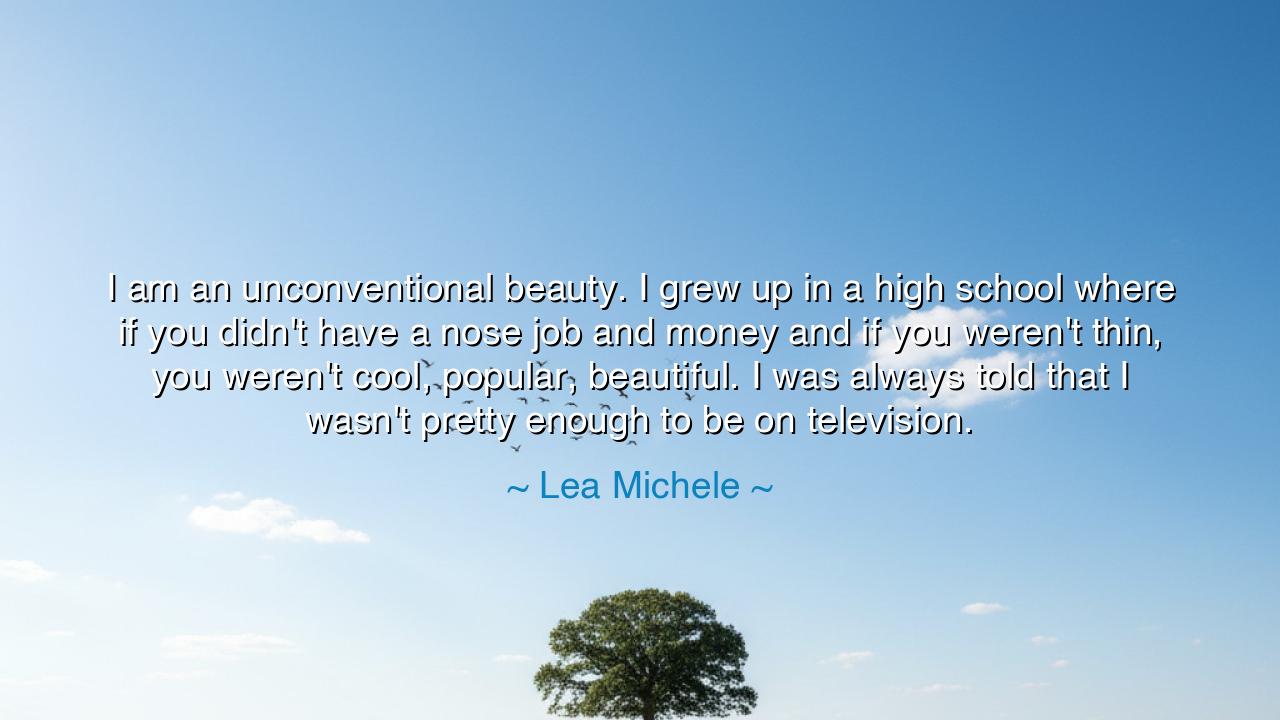
I am an unconventional beauty. I grew up in a high school where
I am an unconventional beauty. I grew up in a high school where if you didn't have a nose job and money and if you weren't thin, you weren't cool, popular, beautiful. I was always told that I wasn't pretty enough to be on television.






"I am an unconventional beauty. I grew up in a high school where if you didn't have a nose job and money and if you weren't thin, you weren't cool, popular, beautiful. I was always told that I wasn't pretty enough to be on television." These words from Lea Michele reflect a timeless struggle—the battle to define beauty in a world that often imposes narrow, external standards upon us. Michele’s statement speaks to the deep emotional experience of growing up in an environment where the worth of an individual is measured not by inner qualities or character, but by appearance, wealth, and conformity. She voices the pain of being told she did not meet the conventional standards of beauty, yet in her own words, she finds a deeper, more profound truth—that true beauty is far more than skin deep.
The ancient world too was a place where standards of beauty were rigidly defined, often by those in power. Greek sculptures, for example, created idealized forms of the human body, presenting it in the form of gods and heroes. These figures were often perfected—thin, muscular, symmetrical—a vision of beauty that left little room for the diverse realities of human form. Yet, even in those times, there was an understanding that true beauty was not limited to physical appearance. Socrates, the great philosopher, was famously depicted as unattractive in his outward form, yet he is remembered not for his appearance, but for his wisdom, his integrity, and his profound impact on the world. He proved that beauty could be measured by the strength of one’s character, not merely by the shape of one’s features.
In the stories of the ancients, we find many heroes and heroines who were not physically beautiful by the standards of their time but whose beauty came from their courage, their wisdom, and their actions. Helen of Troy, while said to be the most beautiful woman of her age, sparked war and devastation, her beauty becoming both a blessing and a curse. Her story reminds us that beauty—even when it conforms to societal expectations—can carry its own tragedy. Conversely, figures like Antigone, though not praised for their physical beauty, are remembered for their strength, defiance, and loyalty to their values. True beauty is found in the choices we make and the way we stand up for what is right, not in the fleeting, external characteristics that society often prizes above all else.
Lea Michele's words also echo the struggles of the Renaissance artists who sought to capture not just the perfect human form but also the complexity of the human spirit. Leonardo da Vinci and Michelangelo, for all their pursuit of symmetry and proportion in their art, understood that the true beauty of humanity could not be captured in a mere aesthetic. They celebrated the depth of the human experience—the mind, the soul, and the emotions—elements that transcend physicality. Just as Da Vinci’s Mona Lisa is admired not just for her calm, enigmatic smile but for the mystery and depth she conveys, so too must we learn to appreciate the inner beauty that resides within each person, regardless of how they meet external standards.
The modern world, much like the societies of old, often equates popularity and success with external appearances—wealth, thinness, youth. These standards, rooted in superficiality, create a world where individuals feel pressured to conform, to alter themselves in pursuit of validation. But as Michele's words reveal, there is a deeper beauty that cannot be captured by such standards. She rose to prominence not because she fit the mold of conventional beauty, but because of her talent, her resilience, and her ability to own her uniqueness. Her story is one of embracing what makes her different, finding strength in what the world deemed her imperfections.
The lesson from Michele's words is one that has echoed through history: beauty cannot be confined to a single, narrow definition. It is multi-faceted, evolving, and deeply personal. To seek beauty in only the external is to miss the richness of the human experience. Just as the ancients understood that true greatness lies not in physical form but in wisdom, virtue, and action, so too must we embrace a broader, more inclusive view of beauty. Let us value ourselves and others for the depth of our character, the strength of our spirit, and the compassion we show to the world.
So, let us take action in our own lives by rejecting the narrow standards imposed by society. Let us celebrate the beauty that is authentic, that is unique, and that stems from the inner strength each of us carries. Let us remember that we are beautiful not because we conform to an image, but because of the values we live by, the courage we show in the face of adversity, and the love we extend to others. True beauty is not in perfection, but in the power we have to shape our own narrative and embrace the fullness of our humanity.






AAdministratorAdministrator
Welcome, honored guests. Please leave a comment, we will respond soon